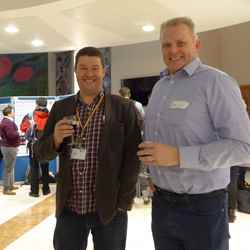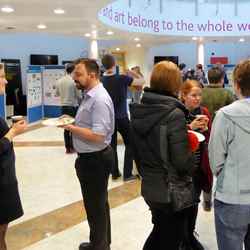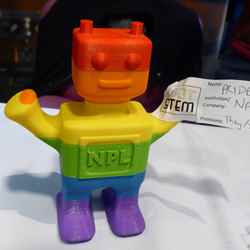LGBT+ STEMinar 2018 sees the largest UK meeting of LGBT+ STEM professionals
The University of York hosted this year’s LGBT+ STEMinar – an event that brings together lesbian, gay, bisexual, and transgender scientists to share their research and explore the challenges they face. We supported the event through our inclusion and diversity fund and awarded travel/caring bursaries to members attending the event.
The LGBT+ STEMinar aims to showcase the diversity of people working across all STEM disciplines, celebrating the contributions of LGBT+ scientists and engineers, and providing role models and support to those at the early stages of their career.
Dr Beth Montague-Hellen, organiser of the first LGBT+ STEMinar in 2016, gave the opening keynote speech, reflecting on the importance of community and role models, and highlighting how much the event has grown in the last two years.
There were a number of scientific talks from all STEM disciplines, covering topics from pulsars and bat speciation, to the chemistry of the origins of life.
Our inclusion and diversity programme officer Philippa Matthews attended the event and said, “The conference is a great opportunity for scientists to present their work in a relaxed and welcoming environment, and is particularly good experience for early career researchers. It was great to see York University Masters student, Kiri Thornalley, presenting her work on self-assembled systems, alongside those much further on in their careers. We're really proud to be supporting events like the LGBT+ STEMinar that show how inclusive the STEM community can be.”
Stephanie Rankin-Turner, PhD student at Loughborough University and recipient of one of our travel bursaries, presented a poster of her research into mass spectrometry techniques in forensic science. “I really enjoyed it; I loved the variety of research presented,” she said. “Ordinarily, PhD researchers only really go to conferences in their own fields of work, so you don't often get to hear about the research going on in completely different areas.
“Everyone felt so comfortable and at ease. It's the only conference I've ever been to where I felt entirely comfortable approaching anyone and talking to them, even people I'd never met before.”
“It was really friendly. Everyone was very supportive of each other – it's unlike any other conference I've been to,” said Charlie Gell, a final year PhD student at Lancaster University, who researches rotaxanes for molecular machines. “I enjoyed meeting people that were further along in their careers in STEM fields and finding out how they'd got to where they were and how their career has gone for them. “It’s a really important event for me. I know very few other out scientists, and it's one of the few opportunities I have to meet them, other than using Twitter.”
As well as the scientific talks and flash poster presentations, there were parallel sessions on LGBT+ students’ experiences of STEM learning in school, how to be yourself when communicating science, using science and facts to challenge LGBT+ misconceptions, and how scientific professional bodies can be more inclusive. Professor Tom Welton, dean of the faculty of natural sciences at Imperial College London, gave the closing keynote talk on his personal career path and experiences of being out in academia.
Dr Derek Wann, senior lecturer in the department of chemistry at the University of York, organised the 2018 meeting. He said, “I’m so pleased that Leonie Jones and myself managed to bring 120 LGBT+ colleagues together. As someone who spoke at the first STEMinar in 2016 in front of 60 delegates it was fantastic to see how the diversity of the meeting has evolved. Whether we like it or not, as ‘out’ scientists we are role models to LGBT+ students. It is so important that everyone feels that they belong in academia, industry, education or any other scientific field. To be able to show off the National STEM Learning Centre with its great facilities just added to the occasion.”
“I think it's really important in two different ways,” says Stephanie. “On one hand, it's nice to highlight the work being carried out by LGBT+ scientists, but not only highlight that within our own community, but also share it with other people. Something we talked about at the conference was the lack of LGBT+ role models for younger people. A lot of the time, if you think of famous LGBT+ people they're often in show business or movies. I think it's important to have different role models out there, from different career paths, to inspire younger LGBT+ people into thinking 'yeah, this is the kind of career that is accepting of me, regardless of who I am'.”
Read a write up of the event by Professor David Smith from York University and check out the comprehensive Twitter coverage of the day at #LGBTSTEMinar18. The hashtag was trending in the top 5 in the UK during the event.
The next LGBT+ STEMinar will be held in London in 2019, hosted by the Royal Astronomical Society and the Institute of Physics.
To find out more about the LGBT+ STEMinar series of conferences and to explore the contributions of LGBT+ people working in STEM, visit the LGBT STEM blog.
LGBT+ physical sciences network
We’ve teamed up with the Institute of Physics and the Royal Astronomical Society to join the LGBT+ physical sciences network (formerly physicists and astronomers network). The network’s steering group comprises representatives from all three learned societies as well as SEPNET and Stonewall, and aims to connect the LGBT+ physical sciences community. You can sign up to the network here.
The network is running a survey in March this year, which will be the first UK and Ireland survey of the working, teaching and studying climate for LGBT+ physicists, astronomers and chemists, and those in related sciences. Find out more and sign up to the survey launch event.
Press office
- Tel:
- +44 (0) 20 7440 3351
- Email:
- Send us an email



